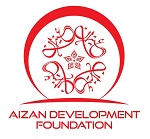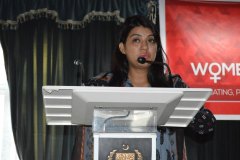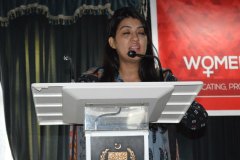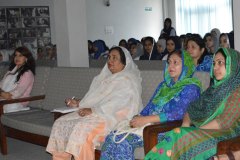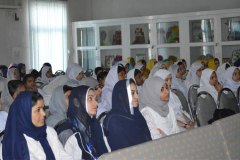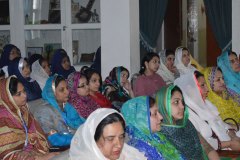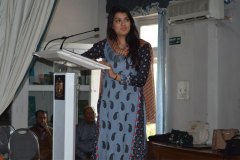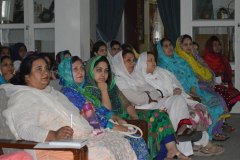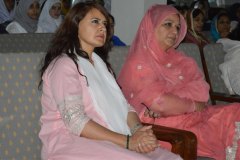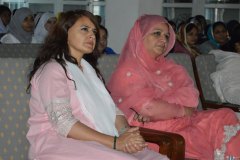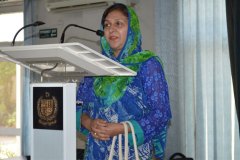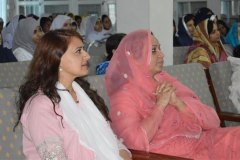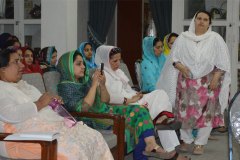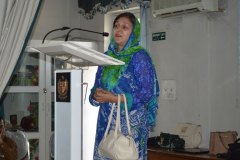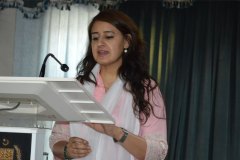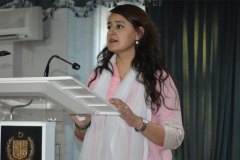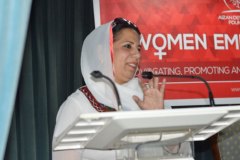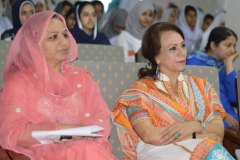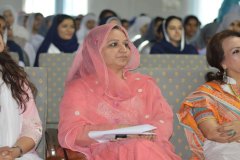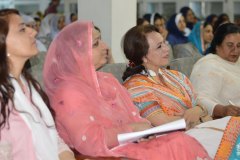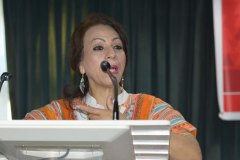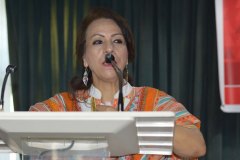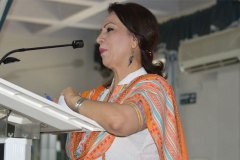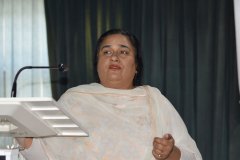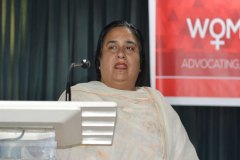Women Empowerment Seminar at Women Welfare & Development Centre
Aizan Development Foundation conducted a seminar on Women Empowerment with over 200 women and young girls at The Women Welfare Development Centre (WWDC) Islamabad on Tuesday 19th May 2015.
The seminar started off with the recital of the Holy Quran. After this, Nazia Raja, Executive Director of Aizan Development Foundation gave the participants a warm welcome and spoke about Women Empowerment in general, mentioning the progress made to date across Pakistan. She talked highly about the Development Centre and encouraged the ladies and girls to get involved in the vocational courses offered here so that they could help their families earn a living and or even start their own businesses. Nazia highlighted that by learning and investing in a lifetime skill; one can economically improve their way of living.
Next an inspiring documentary on Women Empowerment was shown to the participants. Ms Aniqa Raza, Director Programmes spoke to the audience about this video and discussed what it really means for women to be empowered. She moved on to highlight and talk about the various women protection laws available across Pakistan. The laws talked about included:
- Protection against Harassment of Women at the Workplace Act 2010
- Child Marriage Restraint Act 1929
- The Criminal Law (Second Amendment) Act, 2011
Aniqa then called on the participants to share their success stories with the audience. Two women Riffat Wajid and Sitara Khan were called on stage. They spoke about their struggle and hardship in attaining or reaching their goals. Both stories were highly inspirational and the audience listened carefully. Riffat and Sitara had both learnt their skills, which they were now using in their own businesses from this Women Welfare and Development Centre. They were both very grateful to have been given this opportunity and felt that it was a lifetime changing move for them. Without having attained the skills, their situation would not have changed. By attending the Development Centre and learning the relevant skill, they were both able to improve their lives and were very happy. They both shared how they support their families financially and help mange their homes on the income they earn from their respective businesses. Listening to both women speak about the hardship they had suffered and the results they had achieved was encouraging.
Shazia Jamal, Programme Manager at ADF then went on to share her success story. She spoke about empowering herself after eight years of marriage. Shazia explained how she completed her education after marriage. And since completing her education, Shazia shared how she has been working and helping contribute financially towards the family expenses and helping support her children.
Next, Dr. Farzana Bari, who was the Chief Guest for this event was called on to the stage to give her presentation and talk on the topic of Women Empowerment. Dr Farzana Bari is a well-known Women’s Rights Activist and Director at Center of Excellence, Gender Studies, Quaid-e-Azam University, Islamabad. She spoke about the importance of education for women. She was of the view that if women focus on acquiring education along with other useful skills, they would be in a position to empower themselves and become less dependent on others. Dr Farzana Bari shared, that the only way for women to feel empowered was by bringing about change in society. She stated that:
“Only a woman belonging to a developed society with broad minded citizens, can truly feel empowered. Making more and more laws regarding women rights, and ensuring their implementation plays a vital role in achieving that.” Her speech was encouraging and inspiring for the young participants.
Following on, Arifa Mazhar was called on to the stage to share her views and ideas about Women Empowerment. Arifa is currently working with Group Development as Director Programmes. She spoke about various forms of violence and its different forms. She shared her views on how it impacts the life of women who are affected by violence. She said that changes regarding violence against women need to be made, and this change begins within oneself.
“Each and every one of us needs to raise our voice, so we can be heard.” Arifa further went on to talk about the various protection laws available to women across Pakistan. She spoke about lack of implementation and how awareness of those who do not know about these laws and protection should be raised. She was of the view that men and women should be given equal rights and opportunities. It is our responsibility as women and girls to fight for such rights and make the best of our lives. We have the right and power to improve our lives. If we change our mindsets, we can work towards helping other women move towards progress and out of poverty. Women should play their role in society and speak up for their rights and get recognition for the contribution they make towards their households.
Next, Director of Women Welfare & Development Centre, Ms Ismat Afridi, imparted her feelings in a beautiful manner. She shared, “There are not 250 women learning skills in this institution. These are 250 families, who are trying to improving their economic conditions through the talents of these brilliant ladies.” Ismat was of the view, that these women can play their roles in a better way and improve their lives, if they are well aware of their rights. She said that she was the only woman in her tribe, who had left her home, and had managed to empower herself to be able to provide for herself and her family today. She was committed to her role and her institution and firmly believed in helping the young students of this institution achieve their goals of self-empowerment, self-dependence and economic empowerment. Ismat believed that Pakistani women have proved that they are not less than anybody else, and can work both inside and outside of their homes as well as make a powerful difference in society.
Nazia Raja then wrapped up the session thanking all the all the speakers for their inspirational speeches and for sharing their valuable time and expertise. Group photos were taken followed by tea.
